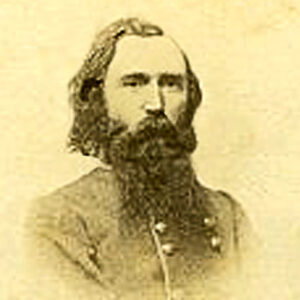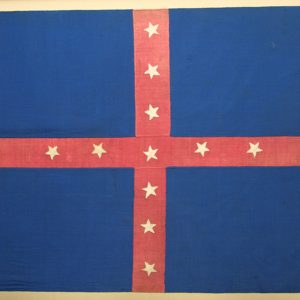calsfoundation@cals.org
Archibald Dobbins (1827–?)
Archibald S. Dobbins was a planter and a colonel in the Confederate army who spent most of the war leading cavalry units in Arkansas and Missouri.
Archibald Dobbins was born in 1827, in Maury County, Tennessee, the son of David Dobbins and Catherine (Gilchrist) Dobbins; he had at least six siblings. His parents were farmers, and he grew up near Mount Pleasant, Tennessee. In 1850, Dobbins married Mary Patience Dawson. By the early 1850s, he had moved to Arkansas to establish himself as a planter. He purchased land in Phillips County, as well as land across the Mississippi River in Coahoma County, Mississippi. He became wealthy and established himself as part of the Helena (Phillips County) community.
Dobbins did not serve in the military during the first year of the war but rather continued his occupation as a planter. In 1862, Dobbins crossed the Mississippi River and joined the Confederate army near Corinth, Mississippi. There, he served as a colonel on the staff of fellow Helena resident Major General Thomas C. Hindman. In May 1862, both men returned to Arkansas. Dobbins continued to serve in staff roles until the following year. Dobbins raised a unit to serve under his command in 1863. Called the First (Dobbins’) Arkansas Cavalry Regiment, it consisted of men from the northeastern corner of the state. The regiment first served as a detached command in the Helena area, where it skirmished with Federal troops. Dobbins and his men joined the Confederate army under the command of Lieutenant General Theophilus Holmes in the summer of 1863. He led his regiment at the Battle of Helena and was promoted to command a brigade during the Little Rock Campaign later that year.
During the Little Rock Campaign, Dobbins became involved in a feud between his commander, Brigadier General Lucius M. Walker, and Brigadier General John S. Marmaduke, another division commander. Marmaduke criticized Walker’s performance at both the battles at Helena and Bayou Meto near Little Rock (Pulaski County), and Walker responded by challenging Marmaduke to a duel. Marmaduke killed Walker, and Dobbins refused to submit to Marmaduke’s command. Marmaduke had Dobbins arrested for refusing to obey orders, but he was returned to command of his brigade, as the army needed him in the field. Dobbins later stood trial on the charges and was convicted. He was ordered to be discharged, but the matter was eventually dropped and he returned to command.
Dobbins did not actively participate in the Camden Expedition, serving in eastern Arkansas at the time (including at Wallace’s Ferry), but did return to command in 1864. He led an Arkansas cavalry brigade during Major General Sterling Price’s raid into Missouri. At the September 1864 Battle of Pilot Knob in Missouri, his brigade allowed the Federal troops occupying Fort Davidson to slip out during the night and escape the encircling Confederates. Dobbins returned to Arkansas with the rest of Price’s command. There, he took command of a district in the northeastern part of the state before taking command of another brigade in the spring of 1865. Dobbins traveled to Texas, where he surrendered and was paroled by Federal authorities in Galveston on July 13, 1865. He ended his service as a colonel.
Dobbins maintained several business interests after the war and eventually moved to Brazil, building a saw and grist mill near Itaituba. The last contact his family received was in 1869; some historians believe that he was murdered around this time by some of his employees. Other sources report that he was running a hotel in Rio de Janeiro in 1874. An 1881 article in the Chicago Tribune suggests that he was alive in Argentina in 1880.
For additional information:
Allardice, Bruce S. More Generals in Gray. Baton Rouge: Louisiana State University Press, 2006.
Dalehite, Bob. “Arch S. Dobbins.” Phillips County Historical Quarterly 4 (September 1965): 15–31.
———. “Colonel Archibald S. Dobbins.” Independence County Chronicle 5 (January 1964): 39–51.
David Sesser
Henderson State University
 Civil War through Reconstruction, 1861 through 1874
Civil War through Reconstruction, 1861 through 1874 Military
Military Archibald Dobbins
Archibald Dobbins  Dobbins's Cavalry Flag
Dobbins's Cavalry Flag 




Comments
No comments on this entry yet.